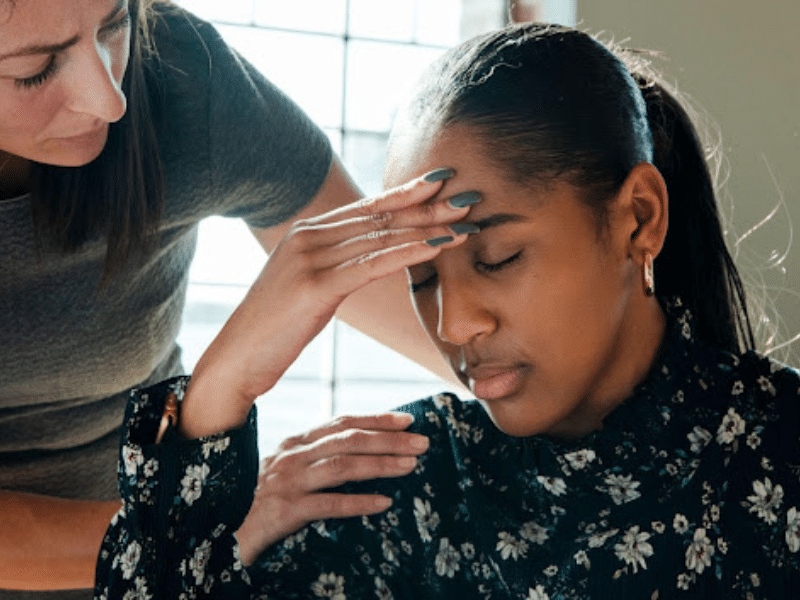
Understanding the Dizzying Journey of Menopause: Causes, Symptoms and Treatments
Menopause and Dizziness: Expert Tips to Manage the Discomfort
Menopause, a significant transitional phase in women’s life marks the cessation of her menstrual cycle and childbearing age. It is a completely natural process occurring between the ages of 45 to 51 years in which a woman’s body stops producing enough estrogen hormone. The onset of menopause initiates a variety of bothersome symptoms such as hot flashes, mood swings, night sweats, and irritability. Among such symptoms, dizziness is also a well-pronounced symptom however it is less commonly discussed but equally disruptive that significantly impacts the quality of life.
Dizziness during menopause can be evidenced in various forms, from lightheadedness to a more severe sensation of vertigo which feels like spinning of room uncontrollably. Through this blog, let’s understand the causes, symptoms, and management of dizziness during the complex menopausal phase.
What are the Types and Causes of Dizziness?
Dizziness is comprehensively used to describe a wide range of sensations, including lightheadedness, unsteadiness, and spinning sensation of surroundings termed vertigo. These terms are slightly different in terms of the underlying cause.
Let’s understand different types of dizziness:
1. Presyncope (Lightheadedness)
It is the sensation of feeling faint or lightheaded without losing complete consciousness. It is often caused due to reduced blood flow to the brain, low blood pressure, dehydration, anemia, arrhythmias, and sometimes the side effects of medications. This further may lead to sweating, nausea, blurred vision, and palpitations.
2. Vertigo
It is a sensation that feels like the spinning or moving of surroundings when there is no actual movement, usually caused due to issues in the inner ear (vestibular system). This is accompanied by nausea, vomiting, difficulty walking, hearing loss, or tinnitus.
3. Disequilibrium
This is merely a feeling of unsteadiness or imbalance while walking and veering to one side. Unlike vertigo, it does not cause a spinning sensation. Diseases like Parkinson’s, peripheral neuropathy, and musculoskeletal problems typically induce disequilibrium because they directly impact brain functioning.
4. Psychogenic Dizziness
This type of dizziness is influenced by psychological disorders including anxiety, depression, and stress, and may not have a clear physical cause.
5. Cervicogenic Dizziness
It arises from neck problems, particularly related to cervical spine disorders. Conditions like cervical spondylitis affect the nerves or blood flow in the neck, leading to dizziness.
6. Ocular Dizziness (Visual Vertigo)
Ocular dizziness arises when the body’s sense of balance and the visual information that the brain receives clash. It is triggered by conditions like vestibular dysfunction, eye misalignment, and consistent exposure to moving patterns.
7. Peripheral and Central Dizziness
Peripheral dizziness is related to difficulties in the inner ear or vestibular nerve with intense symptoms while central dizziness is associated with issues in the central nervous system, for instance, the brainstem or cerebellum. Other neurological symptoms like double vision, trouble speaking, or issues with coordination may accompany it.
These types of dizziness are not directly linked with menopause however, their severity, occurrence, and persistence get heightened during menopause and thereby, impact the quality of life.
Women experiencing menopause suffer from dizziness due to various causes:
Roller Coaster Hormones
Severe fluctuation in hormones especially estrogen during menopause has a profound impact on the vestibular system (our sensory system that helps maintain the senses of balancing and spatial orientation). Estrogen has a proven role in regulating blood flow to the brain that gets compromised amid menopause due to a reduction in its level and so does cerebral circulation thus, leads to episodes of dizziness.
Vasomotor Symptoms
These are the group of symptoms that are primarily related to the regulation of blood vessel constriction and dilation, which affects the body’s ability to control temperature. Hot flushes and night sweats are the two most common vasomotor symptoms predominated during menopause and they badly affect thermoregulation of the body.
Their recurrence can cause a sudden drop in blood pressure, leading to feelings of faintness. Additionally, the rapid heartbeat and sweating associated with hot flushes can exacerbate feelings of dizziness.
Migraines
At the starting phase of menopause, many women experience migraines which are often accompanied by dizziness and therefore, disturb body balance and coordination.
Psychological Factors
Psychological factors cause dizziness through various pathways including breathing patterns, muscle tension, hormonal imbalance, anxiety, and sleep quality. The mind-body connection is strong, and psychological distress can manifest physically in the form of dizziness.
Blood Sugar Levels
Estrogen plays a crucial role in regulating blood sugar levels by enhancing insulin sensitivity, modulating glucose production, and influencing fat distribution. During menopause, due to declined estrogen, these processes get disrupted, leading to fluctuation in blood sugar levels. These fluctuations (either hyperglycemia or hypoglycemia) cause dizziness, particularly if they occur rapidly.
Reverberations of Dizziness on Daily Living
Dizziness during menopause significantly impacts the woman’s daily life where simple activities like walking, driving, or even standing up quickly can become daunting tasks. Every time, the fear of falling or losing balance can lead to a reduction in physical activity, which in turn can contribute to a decline in overall health and well-being.
Moreover, dizziness along with other menopausal symptoms may exacerbate the feelings of anxiety and depression due to hormonal fluctuation.
How to Deal with Menopausal Dizziness
While dizziness during menopause can be challenging, several strategies and treatments can help manage these symptoms:
1. Hormone Replacement Therapy (HRT)
HRT is often recommended to alleviate the symptoms of menopause by supplementing the body with exogenous estrogen and sometimes progesterone. For some women, HRT can help reduce dizziness by stabilizing hormone levels however, HRT is not suitable for everyone, and it is very important to discuss the potential risks and benefits with the healthcare providers.
2. Medications
Various medicines with different modes of action are prescribed accordingly to mitigate the dizziness, especially during menopause. Antihistamines such as meclizine are being given to reduce vertigo by blocking the action of histamine, a chemical that induces dizziness.
Vestibular suppressants help reduce the activity of the vestibular system. Such medicines are prescribed to those who are experiencing severe vertigo. Sometimes, doctors also prescribe antidepressants to women whose dizziness is linked to anxiety or depression.
3. Vestibular Rehabilitation
It is a kind of physical therapy specially designed to improve balance, and coordination and reduce dizziness. It involves specific exercises that help the brain adapt to changes in the vestibular system, reducing the frequency and severity of dizziness episodes.
4. Modification in Lifestyle
The approach of making lifestyle changes like adopting a healthy diet, regular exercise, stress management, staying hydrated, and meditation can help reduce the frequency and severity of dizziness and bring positivity toward quality of life.
5. Herbal Remedies
Some women find relief from dizziness by using herbal supplements like ginger, peppermint, leaves of Ginkgo biloba, lemon balm, and black cohosh.
Does Dizziness Seek Medical Attention?
While dizziness during menopause is often related to the declined hormones, it is crucial to figure out other potential causes, especially if the dizziness is persistent. Conditions such as anemia, cardiovascular disorders, and inner ear disorders can also contribute to dizziness and may require medical intervention to determine the underlying cause and appropriate treatment.
Additionally, if dizziness is accompanied by other concerning symptoms such as chest pain, shortness of breath, severe headache, and sleeplessness, immediate attention is required.
Psychological Impact of Menopausal Dizziness
In some women, dizziness triggers panic attacks, which further exacerbate the symptoms and therefore, the psychological toll of dizziness during menopause should not be underestimated. The unpredictability of dizziness episodes can lead to increased anxiety and depression. For such women, cognitive-behavioral therapy (CBT) can be an effective tool for managing the psychological impact of dizziness.
More Points to Remember When Dizziness Triggers…
- The experience of menopause might be experiencing solitude, particularly when symptoms like dizziness interfere with daily life. Building a strong support network is essential for coping with the challenges of menopause. Miror Therapeutics Pvt. Ltd. provides such a platform where women can share their experiences with peers and provides them emotional support, comfort, and practical advice.
- Some preventive measures and safety tips should be followed to avoid the risk of falls amid dizziness:
- Use Support: Hold onto a stable object, such as a handrail when standing or walking to maintain balance. There is no shame in protecting yourself!
- Wear Appropriate Footwear: The selection of shoes with good support and non-slip soles is a good idea to reduce the risk of slipping.
- Using Assistive Devices: If dizziness is severe, using a cane or walker can provide additional stability.
- Take Your Time: Move slowly when changing positions, such as standing up from sitting or lying down. Remember that sudden movements can lead to body misalignment and can trigger dizziness.
Final Takeaway
Menopause is a complicated and multifaceted phase in women’s life that brings a range of physical and emotional changes. Dizziness, though often overlooked, is a significant symptom along with others during menopause that impacts a woman’s quality of life and well-being.
By understanding the underlying causes, recognizing the symptoms, and exploring various strategies for its management, women can take proactive steps to manage dizziness during menopause.
Citations
- BioPsychoSocial Medicine (2018). Dizziness in peri- and postmenopausal women is associated with anxiety: a cross-sectional study. Retrieved from https://www.ncbi.nlm.nih.gov/pmc/articles/PMC6291970/pdf/13030_2018_Article_140.pdf
- Healthline (2023). Is Dizziness a Symptom of Menopause? Retrieved from https://www.healthline.com/health/menopause/menopause-dizziness#causes
- MedicalNewsToday (2024). Does menopause cause dizziness? Retrieved from https://www.medicalnewstoday.com/articles/319860
- Menopause Natural Solutions (2022). Dizziness in Menopause. Retrieved from https://www.menopausenaturalsolutions.com/blog/dizzy

Poonam Rawat





